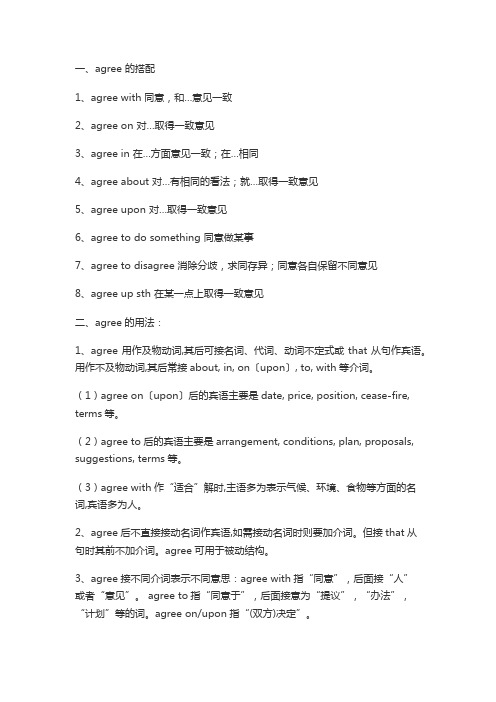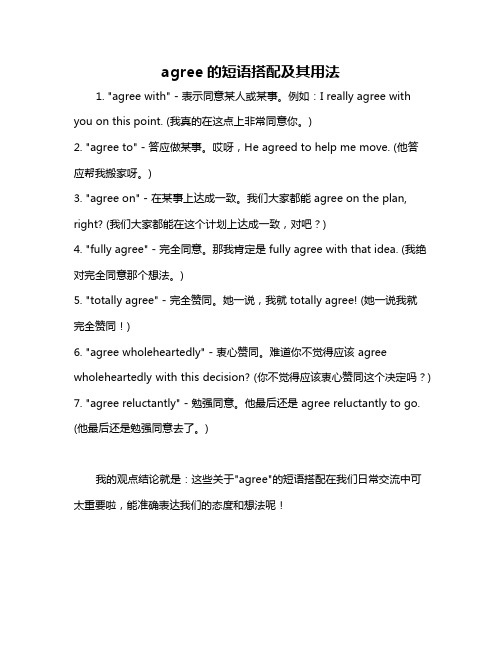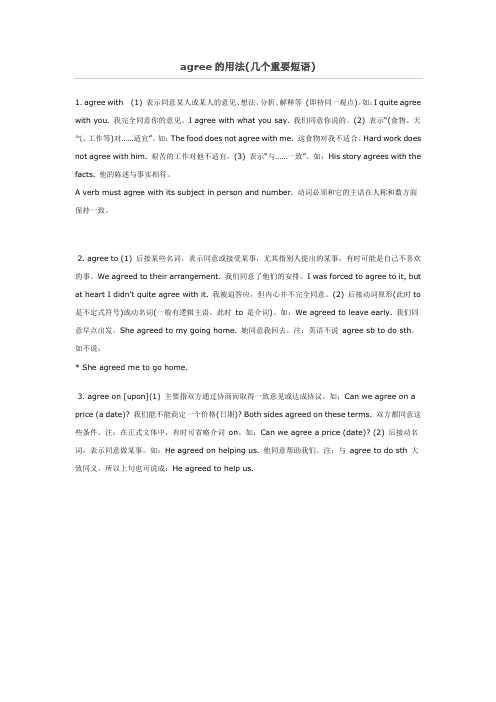agree的用法(几个重要短语)
agree的用法及解释

agree的用法及解释对于agree的用法,常常被很多人忽略,其实对初学者来说,agree是一个常见的词汇,它的用法有很多,那么你了解多少呢?下面是小编给大家带来的agree的用法及解释_agree的六个用法总结,以供大家参考,我们一起来看看吧!agree的解释v. 同意; 赞成; (对…) 取得一致意见,一致同意; 应允; 答应;[例句]If we agreed all the time it would be a bit boring, wouldn't it?如果我们总是意见一致,就会有点无趣,对吗?[其他] 第三人称单数:agrees 现在分词:agreeing 过去式:agreed 过去分词:agreedagree to,agree with,agree on,agree about的用法区别.1.agree (to sth) 意为“同意;愿意;答应(某事物)”.如:Is he going to agree to our suggestion?他会同意我们的建议吗?2.agree with sb 意为“适合(某人的健康或胃口)”,尤用于否定句或疑问句中.如:The climate there doesn\'t agree with him.那里的气候对他不合适.3.agree (with sb) (about / on sth) 意为“同意;(与某人)意见一致”.如:We couldn\'t agree on a date/ when to meet.关于日期(什么时候见面),我们没有能取得一致意见.4.agree sth意为“在某事物上取得一致意见;商定”.如:Can we agree a price?我们能不能商定一个价格?5.agree (with sth) 意为“与(某事物)相一致;相符合;相吻合”.如:Your thoughts didn\'t agree with mine.你的想法和我的想法不一致.6.be agreed(on /about sth)意为“达成协议;意见一致”.如:We are all agreed on the best action.我们都同意这一最佳措施.7.agree后面还可以接宾语从句,即be agreed that ...如:It was agreed that another meeting was necessary.大家都认为有必要再开一次会.agree的六个用法agree一般与with连用,agree with sb.,表示同意某人的观点agree vt. & vi. 基本用法如下1)单独使用,表示同意、答应等。
agree的用法和固定搭配

一、agree 的搭配1、agree with 同意,和…意见一致2、agree on 对…取得一致意见3、agree in 在…方面意见一致;在…相同4、agree about 对…有相同的看法;就…取得一致意见5、agree upon 对…取得一致意见6、agree to do something 同意做某事7、agree to disagree 消除分歧,求同存异;同意各自保留不同意见8、agree up sth 在某一点上取得一致意见二、agree的用法:1、agree用作及物动词,其后可接名词、代词、动词不定式或that从句作宾语。
用作不及物动词,其后常接about, in, on〔upon〕, to, with等介词。
(1)agree on〔upon〕后的宾语主要是date, price, position, cease-fire, terms等。
(2)agree to后的宾语主要是arrangement, conditions, plan, proposals, suggestions, terms等。
(3)agree with作“适合”解时,主语多为表示气候、环境、食物等方面的名词,宾语多为人。
2、agree后不直接接动名词作宾语,如需接动名词时则要加介词。
但接that从句时其前不加介词。
agree可用于被动结构。
3、agree接不同介词表示不同意思:agree with指“同意”,后面接“人”或者“意见”。
agree to指“同意于”,后面接意为“提议”,“办法”,“计划”等的词。
agree on/upon指“(双方)决定”。
4、agreed指“互相同意的”,作为不及物动词的过去分词时,可作形容词,后可接that从句。
5、agree也可作为及物动词的过去分词。
agreed to do表示“在别人建议下同意做某事”,而agreed in doing表示“彼此间相互同意做某事”;。
agree的用法你能“同意”吗?

- 132-校园英语 / 基础教育研究agree的用法你能“同意”吗?甘肃省秦安五中/宋平平在英语作文写作中,学生经常会用到agree来表达同意,但它的用法一直是困扰学生的一个棘手问题,尤其涉及到后面接不同的介词时,更是令部分学生一筹莫展。
下面分别就agree组成的短语通过实例做一说明,以期达到理解并能在实际语境中正确运用的目的。
1. agree with 指出自主观愿望的“同意、赞同”1) agree with sb. 同意,指同意某人的意见。
I can’t agree with you on that point. 在那一点上,我不同意你的意见。
Do you agree with me about the need for more schools? 关于多建一些学校的事,你同意我的意见吗?2) agree with what sb say 同意某人说过的话I quite agree with what you say. 我很同意你所说的。
I agree with most of what you said,but I don’t agree with everything. 我同意你说的大部分,但并不是全部。
3) agree with sth. 同意某事(尤接表主意、意见、看法、观点的词)She agreed with this idea. 她赞成这个主意。
I agree with his analysis of the situation. 我同意他对情况的分析。
另外agree with还可以构成以下结构:4) agree with sb (食物、气候等)与…相一致;适应The climate here agrees very well with me. 此地的气候与我甚是相宜。
You look well. The air and the sea foods in Sanya must agree with you,I suppose. 你看起来很健康,我想三亚的空气和海鲜一定适合你。
agree 的用法

agree 的用法
"Agree" 是一个动词,常用于表示同意或赞成。
它可以用于不同的结构和情境中,以下是一些常见的用法:
1. agree with sb: 同意某人的观点、意见、建议或要求。
例如:I agree with you on this matter.(我在这个问题上同意你的观点。
)
2. agree to sth: 同意某事或某个安排。
例如:He agreed to the proposal.(他同意了这个提议。
)
3. agree on sth: 双方达成一致或共识。
例如:We finally agreed on a solution.(我们最终达成了一个解决方案。
)
4. agree that: 同意某种说法或看法。
例如:We all agreed that it was a good idea.(我们都认为这是一个好主意。
)
5. be agreed upon: 被大家认为是正确或合适的(常用于被passively voice)。
例如:The plan was agreed upon by everyone.(这个计划被大家都认为是合适的。
)
6. agree to disagree: 接受不同的观点或意见,表示同意各自的看法。
例如:We have different opinions, but we can agree to disagree.(我们有不同的
观点,但可以接受各自的看法。
)。
agree的短语搭配及其用法

agree的短语搭配及其用法
1. "agree with" - 表示同意某人或某事。
例如:I really agree with you on this point. (我真的在这点上非常同意你。
)
2. "agree to" - 答应做某事。
哎呀,He agreed to help me move. (他答
应帮我搬家呀。
)
3. "agree on" - 在某事上达成一致。
我们大家都能 agree on the plan, right? (我们大家都能在这个计划上达成一致,对吧?)
4. "fully agree" - 完全同意。
那我肯定是 fully agree with that idea. (我绝对完全同意那个想法。
)
5. "totally agree" - 完全赞同。
她一说,我就 totally agree! (她一说我就
完全赞同!)
6. "agree wholeheartedly" - 衷心赞同。
难道你不觉得应该 agree wholeheartedly with this decision? (你不觉得应该衷心赞同这个决定吗?)
7. "agree reluctantly" - 勉强同意。
他最后还是 agree reluctantly to go. (他最后还是勉强同意去了。
)
我的观点结论就是:这些关于"agree"的短语搭配在我们日常交流中可太重要啦,能准确表达我们的态度和想法呢!。
agree的用法总结

千里之行,始于足下。
agree的用法总结1. Agree可以作为动词使用,表示同意、赞同或接受某种观点、建议、意见或要求。
例如:I agree with your decision.(我同意你的决定。
) They agreed to our proposal.(他们同意我们的提议。
)2. Agree后面可以跟名词、动词不定式、that从句或介词短语。
例如:They agreed to help us.(他们同意帮助我们。
) He agreed that the plan was reasonable.(他同意这个计划是合理的。
)She agreed on a price.(她同意了一个价格。
)3. Agree可以用于表达互相达成一致、协商或商定。
例如:They agreed on a time to meet.(他们商定了一个见面的时间。
)4. Agree可以用于表达意见、立场、观点的一致或相符。
例如:Your opinion agrees with mine.(你的观点与我的观点一致。
)5. Agree可以作为形容词,意为“一致的”或“相符的”。
例如:We are in agreement on this matter.(我们在这个问题上达成了一致。
)The results are in agreement with our expectations.(结果与我们的预期相符。
)第1页/共2页锲而不舍,金石可镂。
6. Agree常和agree with或agree to连用,表示同意或接受某个具体内容。
例如:I agree with your proposal.(我同意你的建议。
) He agreed to the terms and conditions.(他同意了这些条款和条件。
)。
agree的用法你能“同意”吗?

agree的用法你能“同意”吗?作者:宋平平来源:《校园英语·上旬》2017年第12期在英语作文写作中,学生经常会用到agree来表达同意,但它的用法一直是困扰学生的一个棘手问题,尤其涉及到后面接不同的介词时,更是令部分学生一筹莫展。
下面分别就agree 组成的短语通过实例做一说明,以期达到理解并能在实际语境中正确运用的目的。
1. agree with 指出自主观愿望的“同意、赞同”1) agree with sb. 同意,指同意某人的意见。
I can’t agree with you on that point. 在那一点上,我不同意你的意见。
Do you agree with me about the need for more schools?关于多建一些学校的事,你同意我的意见吗?2) agree with what sb say 同意某人说过的话I quite agree with what you say. 我很同意你所说的。
I agree with most of what you said,but I don’t agree with everything. 我同意你说的大部分,但并不是全部。
3) agree with sth. 同意某事(尤接表主意、意见、看法、观点的词)She agreed with this idea. 她赞成这个主意。
I agree with his analysis of the situation. 我同意他对情况的分析。
另外agree with还可以构成以下结构:4) agree with sb (食物、气候等)与…相一致;适应The climate here agrees very well with me. 此地的气候与我甚是相宜。
You look well. The air and the sea foods in Sanya must agree with you,I suppose. 你看起来很健康,我想三亚的空气和海鲜一定适合你。
agree的用法(几个重要短语)

agree的用法(几个重要短语)1. agree with (1) 表示同意某人或某人的意见、想法、分析、解释等(即持同一观点)。
如:I quite agree with you. 我完全同意你的意见。
I agree with what you say. 我们同意你说的。
(2) 表示“(食物、天气、工作等)对……适宜”。
如:The food does not agree with me. 这食物对我不适合。
Hard work does not agree with him. 艰苦的工作对他不适宜。
(3) 表示“与……一致”。
如:His story agrees with the facts. 他的陈述与事实相符。
A verb must agree with its subject in person and number. 动词必须和它的主语在人称和数方面保持一致。
2. agree to (1) 后接某些名词,表示同意或接受某事,尤其指别人提出的某事,有时可能是自己不喜欢的事。
We agreed to their arrangement. 我们同意了他们的安排。
I was forced to agree to it, but at heart I didn’t quite agree with it. 我被迫答应,但内心并不完全同意。
(2) 后接动词原形(此时to 是不定式符号)或动名词(一般有逻辑主语,此时to 是介词)。
如:We agreed to leave early. 我们同意早点出发。
She agreed to my going home. 她同意我回去。
注:英语不说agree sb to do sth。
如不说:* She agreed me to go home.3. agree on [upon](1) 主要指双方通过协商而取得一致意见或达成协议。
如:Can we agree on a price (a date)? 我们能不能商定一个价格(日期)? Both sides agreed on these terms. 双方都同意这些条件。
- 1、下载文档前请自行甄别文档内容的完整性,平台不提供额外的编辑、内容补充、找答案等附加服务。
- 2、"仅部分预览"的文档,不可在线预览部分如存在完整性等问题,可反馈申请退款(可完整预览的文档不适用该条件!)。
- 3、如文档侵犯您的权益,请联系客服反馈,我们会尽快为您处理(人工客服工作时间:9:00-18:30)。
1. agree withwith(1) 表示同意某人或某人的意见、想法、分析、解释等 (即持同一观点)。
如:I quite agree with you. 我完全同意你的意见。
We a; mso-char-indent-count: ; mso-line-height-rulgree with what you say. 我们同意你说的。
(2) 表示“(食物、天气、工作等)对……适宜”。
如:The food does not agree with me. 这食物对我不适合。
Hard work does not agree with him. 艰苦的工作对他不适宜。
(3) 表示“与……一致”。
如:His story agrees with the facts. 他的陈述与事实相符。
A verb must agree with its subject in person and number. 动词必须和它的主语在人称和数方面保持一致。
2. agree to (1) 后接某些名词,表示同意或接受某事,尤其指别人提出的某事,有时可能是自己不喜欢的事。
He agree the plan (the date). 他同意了这个计划(日期)。
We agreed to their arrangement. 我们同意了他们的安排。
I was forced to agree to it, but at heart I didn’t quite agree with it. 我被迫答应,但内心并不完全同意。
(2) 后接动词原形(此时to是不定式符号)或动名词(一般有逻辑主语,此时 to 是介词)。
如:We agreed to leave early. 我们同意早点出发。
She agreed to my going home. 她同意我回去。
注:英语不说 agree sb to do sth。
如不说:
* She agreed me to go home.
3. agree on [upon](1) 主要指双方通过协商而取得一致意见或达成协议。
如:Can we agree on a price
(a date) 我们能不能商定一个价格(日期) Both sides agreed on these terms. 双方都同意这些条件。
注:在正式文体中,有时可省略介词 on。
如:Can we agree a price (date) (2) 后接动名词,表示同意做某事。
如:He agreed on helping us. 他同意帮助我们。
注:与 agree to do sth 大致同义。
所以上句也可说成:He agreed to help us.。
